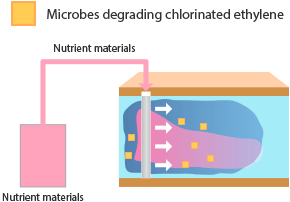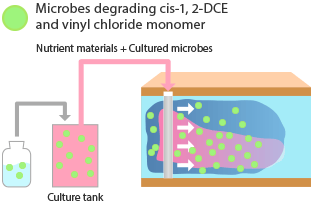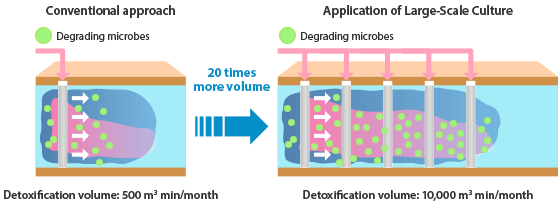2016
March 14, 2016
Achieving mass cultivation of degrading microbes that allow for large-scale decontamination of soil and groundwater
--Enhancing KuriAUG bio-powered methods of purification technology for soil and groundwater, detoxifying even vinyl chloride monomer--
Kurita Water Industries Ltd. (headquartered in Nakano, Tokyo, President and CEO: Toshiyuki Nakai) has developed a technology to mass cultivate microbes that degrade and detoxify different forms of chlorinated ethylene, such as vinyl chloride monomers, and contaminants in soil and groundwater. Taking advantage of this novel mass cultivation technology, we will further expand the areas in which we apply the KuriAUG bio-powered method, which is a form of bioremediation technology for soil and groundwater, and concentrate our expertise on cleaning up large-scale polluted sites with tens of thousands of cubic meters of pollution.
There are two purification methods that employ microbes. The first is biostimulation, which breaks down contaminants by activating indigenous microbes through the addition of nutrient materials. The second is bioaugmentation, which breaks down contaminants by not only adding indigenous microbes, but also injecting cultivated exogenous microbes together with nutrient materials.
We have developed a technology to stably culture Dehalococcoides bacteria. Unlike tetrachloroethylene and other forms of chlorinated ethylene, Dehalococcoides bacteria are the only type of decomposers that do not contain the specific harmful substances listed in the Soil Contamination Countermeasures Act. They can even break down the vinyl chloride monomer that is produced in the degrading process. We have been working since 2008 to apply a KuriAUG bio-powered method such as bioaugmentation, but the areas that could be cleaned in a short period of six months have been limited to small-scale pollution of several thousand cubic meters due to the difficulties in maintaining the activity of microbes for a long time and culturing them on a large scale. To address these problems, we have developed a state-of-the-art technology for mass cultivation, which consists of selecting nutrients like food additives for the microbes and establishing their optimum addition rates, etc., and have succeeded in establishing the culture conditions to maintain the microbe activity and develop a large-scale culture system. Mass cultured degrading microbes have proven their ability in long-term tests at multiple contaminated sites to reliably decompose vinyl chloride monomer and other forms of chlorinated ethylene. Thanks to the development of the mass cultivation technology that allows for the culturing of degrading microbes in one month at 20 times the conventional level, it has become possible to use the KuriAUG bio-powered method to detoxify large-scale polluted sites of several tens of thousand cubic meters in about half a year.
The only microbes capable of breaking down vinyl chloride monomer are Dehalococcoides bacteria. For this reason, vinyl chloride monomer may remain at polluted sites treated with biostimulation or bioaugmentation using other types of microorganisms. Although vinyl chloride monomer is not currently listed as one of the specific harmful substances under the Soil Contamination Countermeasures Act, discussions are being held as to whether it should be labeled as a specific harmful substance. The reference values, which indicate the need for the KuriAUG bio-powered method, are expected to further increase as future revisions are made to the law.
Full utilizing Dehalococcoides bacteria, the only microbes known to decompose vinyl chloride monomer to ethylene, and mass cultivation technology, we will continue to help further reduce the environmental impact by also extending the application of the KuriAUG Bio-powered method to large-scale pollution sites.
Outline of the KuriAUG bio-powered method
<Biostimulation>
Degrades pollutants by activating indigenous microbes through the addition of nutrient materials to the groundwater.
<KuriAUG bio-powered method>
Degrades pollutants by injecting detoxifying microbes cultured in the laboratory into groundwater along with nutrient materials. Also employs Dehalococcoides bacteria, the only microbes that can decompose vinyl chloride monomer.
Culture tank for degrading microbes
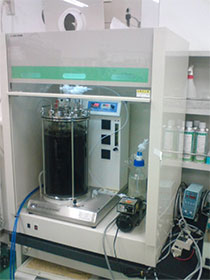
<Conventional culture tank>
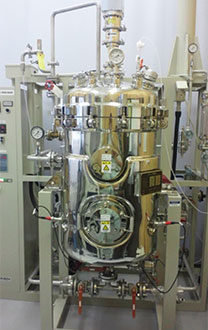
<Large-scale culture tank>
Equipped with the most appropriate controlling system required for the mass cultivation of degrading microbes while scaling up the culture tank volume.
Scale up bioremediation through mass culture of degrading microbes
Thanks to the significant improvement in the ability to culture microbes, large-scale polluted sites several tens of thousand cubic meters can now be decontaminated in a short period of about six months.


